- Home
- Franz Kafka
The Castle Page 11
The Castle Read online
Page 11
She pulled a photograph from under the pillow and handed it to K. “Look at this picture,” she asked. So as to see better, K. took one step back into the kitchen, but even there it wasn’t easy to make anything out in the picture, for it was faded with age, broken in several places, crushed, and stained. “It’s not in very good shape,” said K. “Alas, alas,” said the landlady, “that’s what happens when one keeps carrying it around for years. But if you look at it closely, you’ll surely be able to make everything out. Besides, I can help you, tell me, what do you see, I like hearing things about the picture. So what is it?” “A young man,” said K. “Right,” said the landlady, “and what’s he doing?” “He’s lying down, I think, on a board, stretching and yawning.” The landlady laughed. “That’s quite wrong,” she said. “But here’s the board, and he’s lying here,” said K., insisting on his point of view. “But take a closer look,” said the landlady in annoyance, “now then, is he really lying there?” “No,” K. now said, “he isn’t lying there, he’s hovering, and now I can see that it’s not a board but most likely a rope, and the young man is doing a high jump.” “That’s it,” said the landlady, delighted, “he’s jumping, that’s how the official messengers practice; well, I knew you would make it out. Can you see his face, too?” “I can’t see much of his face,” said K., “he’s obviously making quite an effort, his mouth is open, his eyes are screwed up, and his hair is blowing about.” “Very good,” said the landlady appreciatively, “that’s all anybody who hasn’t seen him in person could possibly make out. But he was a handsome youth, I caught only one fleeting glimpse of him and yet I shall never forget him.” “So who was it?” asked K. “The messenger,” said the landlady, “the messenger Klamm first summoned me with.”
K. found it impossible to listen closely, he was distracted by rattling glass. He immediately found the cause of the disturbance. The assistants were standing outside in the courtyard, hopping from one foot to the other in the snow. They acted as if they were happy to see K. again, out of happiness they pointed him out to each other by tapping on the kitchen window. At a threatening gesture from K. they stopped right away and each tried to push the other back, but one of them slipped past the other and now they were back at the window again. K. rushed into the alcove, where the assistants couldn’t see him and he didn’t have to see them. But there, too, the faint and as if imploring rattle of the windowpanes pursued him for quite a while.
“Those assistants again,” he said to the landlady, so as to excuse himself, pointing out the window. But she was paying no attention to him, she had taken the picture from him, looked at it, smoothed it out and pushed it back under the pillow. Her movements had become slower not out of weariness but under the burden of memory. She had wanted to tell K. something and had forgotten him because of the story. She played with the fringe of her shawl. Not until a little while later did she look up, brush her eyes with her hand, and say: “This shawl comes from Klamm. And the nightcap, too. The picture, the shawl, and the nightcap, those are my three mementos of him. I’m not young like Frieda, I’m not as ambitious as she nor as sensitive, she’s very sensitive, in short I know how to adjust to life, but I must admit that without these three items I wouldn’t have lasted so long here, indeed I probably wouldn’t have lasted a day. To you, these three mementos may seem trivial, but, you see, Frieda, who consorted for so long with Klamm, hasn’t a single memento, I asked her, she’s too effusive and too demanding, but I, who was only with Klamm three times—later on he never sent for me again, I don’t know why—as if sensing the shortness of my time there, I took these mementos along. Of course, one has to do it oneself, Klamm himself never gives one anything, but if one sees anything suitable lying about, one can ask him for it.”
K. felt uncomfortable about these stories, however much they concerned him. “How long ago was that,” he asked, sighing.
“Over twenty years ago,” said the landlady, “well over twenty years ago.”
“So one stays faithful to Klamm that long,” said K. “Landlady, do you realize that you’re causing me great concern, when I think of my own future marriage?”
The landlady considered it unseemly that K. wanted to barge in at this point with his own affairs, and gave him an irritated side-glance.
“Not so angry, Landlady,” said K., “I’m certainly not saying a word against Klamm, but through force of circumstances I have entered into certain relations with Klamm; this is something not even Klamm’s greatest admirer could deny. And so, as a result, whenever Klamm is mentioned I must also think of myself, that cannot be helped. Besides, Landlady”—here K. seized her hesitant hand—“remember the bad way our last conversation ended and that this time we want to part in peace.”
“You’re right,” the landlady said, bowing her head, “but spare me. I’m no more sensitive than anyone else, on the contrary, everybody has sensitive spots, I have only this one.”
“Unfortunately I have the same one,” said K., “but I shall certainly restrain myself; now, Landlady, tell me how I should endure this dreadful fidelity to Klamm in my own marriage, assuming Frieda is like you in this respect.”
“Dreadful fidelity,” the landlady repeated sullenly. “Well, is it fidelity? I’m faithful to my husband, but to Klamm? Klamm once made me his mistress, can I ever lose that distinction? And you ask how you should endure this with Frieda? Oh, Surveyor, who are you who dare to ask such a thing?”
“Landlady!” said K. admonishingly.
“I know,” said the landlady, yielding, “but my husband never asked questions like that. I don’t know who should be considered more unfortunate, me then or Frieda now. Frieda, who willfully left Klamm, or me, whom he never sent for again. Perhaps it is after all Frieda, though she does not yet seem to realize the full extent of this. My thoughts dwelt exclusively on my misfortune, though, for I had to ask myself, and indeed essentially still have to ask myself: Why did it happen? Three times Klamm sent for you, but not a fourth time, never a fourth time! And what could have concerned me more then? What else could I talk about with my husband, whom I married shortly afterwards? By day we had no time, we acquired the inn in a miserable condition and had to try to bring it up to standard, but at night? For years our nighttime conversations circled around Klamm and the reasons for his change of mind. And when my husband fell asleep during these conversations, I woke him up and we went on talking.”
“Now, if you will permit me,” said K., “I will ask you a rather rude question.”
The landlady remained silent.
“So I may not ask,” said K., “that’s enough for me, too.”
“Oh, of course,” said the landlady, “that’s enough for you, that especially. You misinterpret everything, even the silence. You simply cannot help it. I do give you permission to ask.”
“If I’m misinterpreting everything,” said K., “then perhaps I’m also misinterpreting my own question, perhaps it isn’t all that rude. I simply wanted to know how you met your husband and how this inn came into your hands.”
The landlady frowned, but said calmly: “It’s a very simple story. My father was a blacksmith, and Hans, who is now my husband, and who was then a stable boy for a large farmer, often came to see my father. This was just after my last encounter with Klamm, I was very unhappy and actually shouldn’t have been, since everything followed the correct procedure, and the fact that I was no longer allowed to go to Klamm was Klamm’s decision, so it was correct, but the reasons were obscure, I was allowed to probe those reasons but shouldn’t have been unhappy, well, I was all the same, and couldn’t work and sat in our little front garden all day. Hans saw me there, sometimes sat down with me, I never complained to him, but he knew what it was about and, being a good lad, sometimes wept with me. And when the then landlord—whose wife had died and who for that reason had to give up the trade, and anyhow he was already an old man—passed by our little garden and saw us sitting there, he stopped and on the spot offered to lease us the in
n, and, since he trusted us, he didn’t want any money in advance and arranged cheap terms for the lease. I didn’t want to become a burden to my father and couldn’t care about everything else, so, thinking of the inn and all the new work, which might make me forget a little, I gave Hans my hand. That’s the story.”
For a little while there was silence, then K. said: “The landlord’s conduct was fine, but imprudent too, or had he particular reasons for trusting you two?”
“He knew Hans well,” said the landlady, “he was Hans’s uncle.”
“No wonder then,” said K., “so Hans’s family was evidently very interested in the connection with you?”
“Perhaps,” said the landlady, “I don’t know, I never worried about that.”
“Still, that’s how it must have been,” said K., “if the family was ready to make such sacrifices and simply place the inn in your hands without any security.”
“It wasn’t imprudent, as became clear later,” said the landlady. “I threw myself into the work, I was strong, a blacksmith’s daughter, I didn’t need a maid or a servant, I was everywhere, in the taproom, in the kitchen, in the stables, in the courtyard, my cooking was so good I even drew guests from the Gentlemen’s Inn, you have not as yet been in the inn at noon, you don’t know our luncheon guests, there were even more of them then, but in the meantime many have drifted away. And as a result we were not only able to pay the lease on time but after a few years to buy the whole place, and now it’s almost free of debt. The other result, though, was that I ruined myself, had heart problems, and now I am an old woman. You may think I’m much older than Hans, but actually he’s only two or three years younger and will never get any older, for his work—smoking a pipe, listening to the guests, emptying his pipe, and getting a glass of beer every now and then—such work doesn’t make anyone older.”
“Your achievements are admirable,” said K., “no doubt about that, but we were talking about the time before your marriage, and at that time it would have been strange if Hans’s family, under great financial sacrifice, or at least having taken on the great risk involved in giving up the inn, had actually pressed for marriage, for they could only put their hopes in your ability to work, which of course they didn’t know anything about yet, and in Hans’s, which, as they must already have discovered, was nonexistent.”
“Well, yes,” the landlady said wearily, “I do know what you’re getting at and how mistaken you are. There was no trace of Klamm in all this. Why should he have cared about me, or rather: how could he have cared about me? For by then he had forgotten all about me. That he hadn’t called me was a sign he had forgotten me. Anyone whom he no longer summons he forgets entirely. I didn’t want to speak of this in front of Frieda. But it isn’t simply that he forgets, it’s more than that. If you forget someone, you can of course get to know that person again. With Klamm that is not possible. Anyone whom he no longer summons, he forgets, not only for the past but literally for all time. If I make an effort, I can even think my way into your thoughts, which make no sense here, but are perhaps valid in the foreign lands you come from. Perhaps you’re so madly presumptuous as to think that Klamm gave me a husband like Hans so that almost nothing could prevent me from coming to him, should he ever call me in the future. Well, there could be nothing crazier than that! Where is the man who could prevent me from running to Klamm if Klamm gives me a sign? What nonsense, what utter nonsense, one merely makes oneself all confused by toying with such nonsense.”
“No,” said K., “we certainly don’t want to make ourselves all confused, my thoughts hadn’t gone as far as you think, but to tell the truth, they were heading in that direction. For the time being, though, I was merely surprised that the relatives had such high hopes for your marriage and that these hopes were indeed realized, if at some risk to your heart, to your health. The thought that there was a connection between all this and Klamm did occur to me, but not, or not yet, in the crude manner you implied, evidently only so you can shout at me again, for this clearly gives you pleasure. Well, have your pleasure! But these were my thoughts: First, Klamm is obviously the cause of your marriage. Without Klamm you wouldn’t have been unhappy, wouldn’t have sat idly in your little front garden, without Klamm Hans wouldn’t have seen you there, without your sadness the shy Hans would never have dared speak to you, without Klamm you would never have found yourself in tears with Hans, without Klamm your dear old uncle-landlord wouldn’t have seen Hans and yourself sitting there peacefully, without Klamm you wouldn’t have felt so indifferent about life, and so you wouldn’t have married Hans. Well, that is surely enough Klamm, I should say. But there is more. If you hadn’t been trying to forget, you certainly wouldn’t have worked so recklessly and brought the inn up to such a high standard. So there’s also some Klamm there. But even leaving that aside, Klamm is the cause of your illness since even before your marriage your heart was drained by that unfortunate passion. The only question left is why Hans’s relatives found the marriage so appealing. You yourself once mentioned that being Klamm’s mistress is an increase in stature that cannot be lost, so perhaps that is what attracted them. But I believe they were also hoping that the lucky star which led you to Klamm—assuming it was indeed a lucky star, but you claim it was—belonged to you and would remain yours and would not, say, abandon you as quickly or as suddenly as Klamm did.”
“Do you mean all of this seriously?” asked the landlady.
“Very seriously,” said K. quickly, “only I think that the hopes of Hans’s relatives were neither completely justified nor completely unjustified, and I also think I recognize the mistake you’ve made. Outwardly, everything does seem to have worked out, Hans is well provided for, has an imposing wife, enjoys great esteem, the inn is free of debt. But everything didn’t actually work out; with a simple girl, whose first great love he would have been, Hans would certainly have been far happier; if he sometimes stands about the inn as if lost, as you chide him for doing, that’s because he truly does feel lost—not that this makes him unhappy, that’s for sure, I know him well enough by now to be able to say so—but it’s equally certain that this handsome, sensible lad would have been happier with another wife, and by ‘happier’ I mean more independent, more diligent, and more manly. And, after all, you yourself certainly aren’t happy, and, as you yourself said, without those three mementos you wouldn’t want to go on living, and you also have a weak heart. So was it wrong of his relatives to hope? I don’t think so. There were blessings above you, but nobody knew how to get them down.”
“And what was it we failed to do?” asked the landlady. She was now lying stretched out on her back, gazing up at the ceiling.
“Ask Klamm,” said K.
“So we’re back to you,” said the landlady.
“Or to you,” said K., “our concerns overlap.”
“So what do you want from Klamm?” said the landlady. She had sat up straight, shaken out the pillows so she could lean on them as she sat, and now looked K. directly in the eye. “I’ve told you openly about my own case, which you could learn something from. Tell me just as openly what you want to ask Klamm. I had difficulty persuading Frieda to go to her room and stay there, I was afraid you wouldn’t speak openly enough with her here.”
“I have nothing to hide,” said K. “But first I must point out one thing. Klamm forgets at once, you said. Well, first, I find that highly improbable, and second, it cannot be proved, it’s obviously nothing but a legend, concocted in the girlish minds of those who just happened to be in Klamm’s good graces. I’m surprised you believe in such a trite fabrication.”
“It is not a legend,” said the landlady, “but comes from general experience.”
“So it can be refuted by new experiences,” said K. “But then there is one other difference between your case and Frieda’s. As for Klamm’s not having called Frieda again, in a sense no such thing happened, he called her, but she didn’t comply. It’s even possible he’s still waiting for her.”
/>
The landlady remained silent, merely observing K. from head to toe. Then she said: “I want to listen quietly to all you have to say. It’s better if you speak openly and don’t spare my feelings. I have only one request. Do not use Klamm’s name. Call him ‘he’ or something else, but not by his name.”
“Gladly,” said K., “but it’s difficult to say what I want from him. First, I want to see him close-up, then I want to hear his voice, then I want him to tell me where he stands concerning our marriage; whatever other requests I make will depend on how the conversation goes. A number of subjects may come up, but for me the most important thing is simply to be standing there opposite him. I have not yet spoken directly to a real official, you see. That seems harder to achieve than I had thought. But now I have an obligation to speak with Klamm, the private individual, and to my mind that is much easier to accomplish; I can only speak with the official in his perhaps inaccessible office at the Castle or, and this is already quite dubious, at the Gentlemen’s Inn, but I can speak with the private individual at the inn, on the street, anywhere I manage to meet him. The chance of having the official face to face as well is something I shall gladly accept, but that isn’t my primary goal.”

 Diaries of Franz Kafka
Diaries of Franz Kafka Metamorphosis and Other Stories
Metamorphosis and Other Stories The Castle: A New Translation Based on the Restored Text
The Castle: A New Translation Based on the Restored Text The Complete Stories
The Complete Stories In the Penal Colony
In the Penal Colony The Trial
The Trial Amerika
Amerika The Burrow: Posthumously Published Short Fiction
The Burrow: Posthumously Published Short Fiction Sons
Sons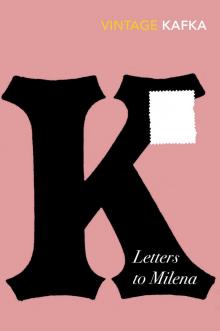 Letters to Milena
Letters to Milena Investigations of a Dog: And Other Creatures
Investigations of a Dog: And Other Creatures Collected Stories
Collected Stories The Great Wall of China
The Great Wall of China The Burrow
The Burrow The Castle
The Castle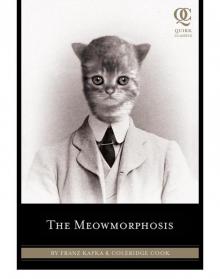 The Meowmorphosis
The Meowmorphosis The Sons
The Sons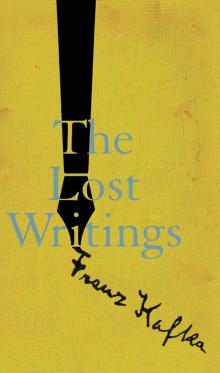 The Lost Writings
The Lost Writings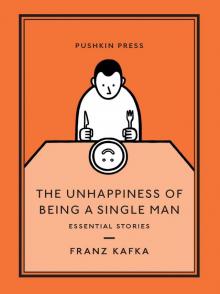 The Unhappiness of Being a Single Man
The Unhappiness of Being a Single Man Amerika: The Missing Person: A New Translation, Based on the Restored Text
Amerika: The Missing Person: A New Translation, Based on the Restored Text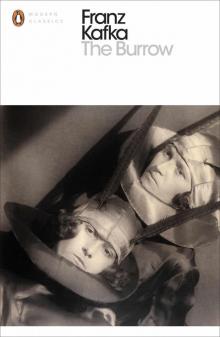 The Burrow: Posthumously Published Short Fiction (Penguin Modern Classics)
The Burrow: Posthumously Published Short Fiction (Penguin Modern Classics) The Diaries of Franz Kafka
The Diaries of Franz Kafka Investigations of a Dog
Investigations of a Dog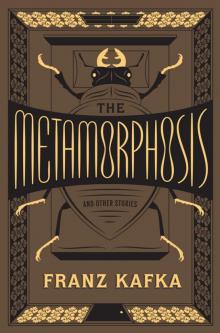 The Metamorphosis and Other Stories
The Metamorphosis and Other Stories The Trial: A New Translation Based on the Restored Text
The Trial: A New Translation Based on the Restored Text